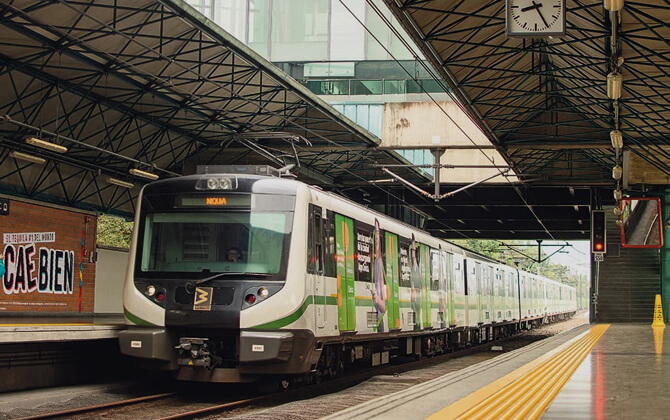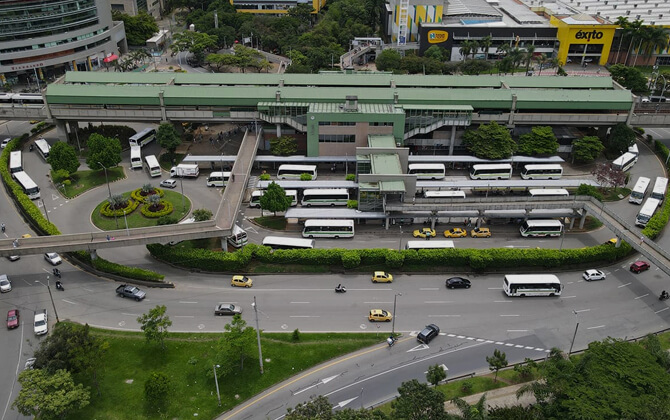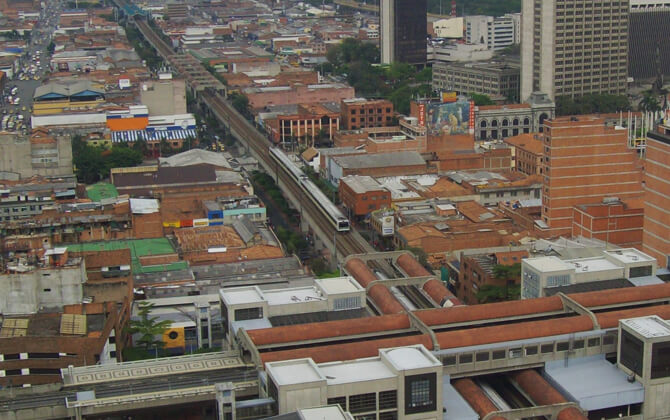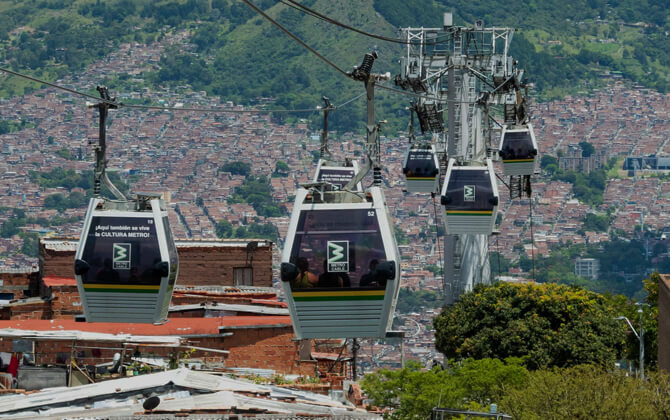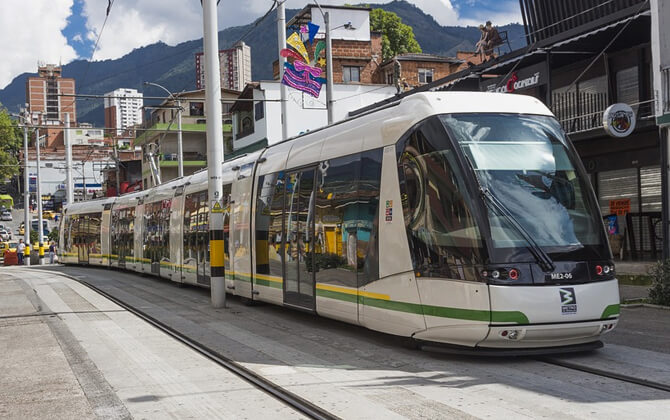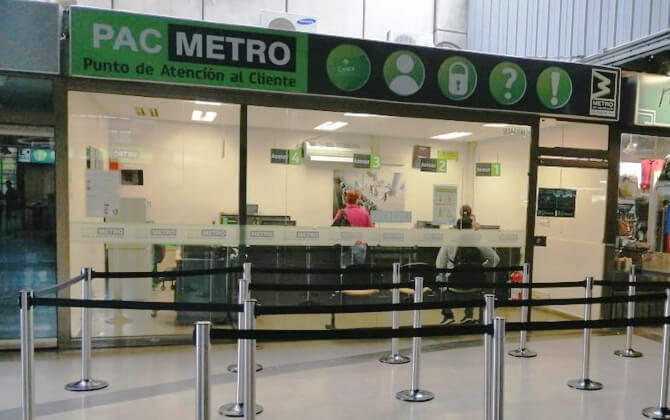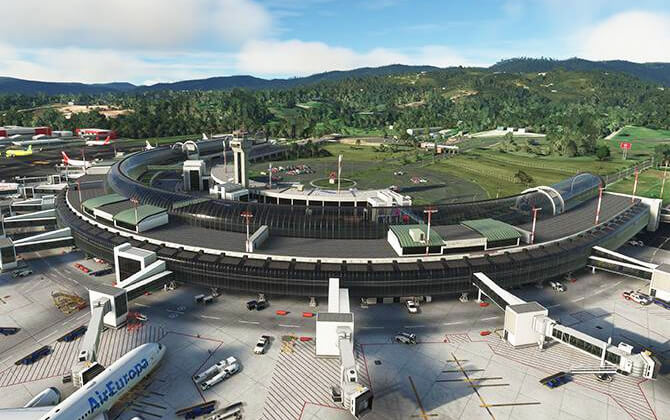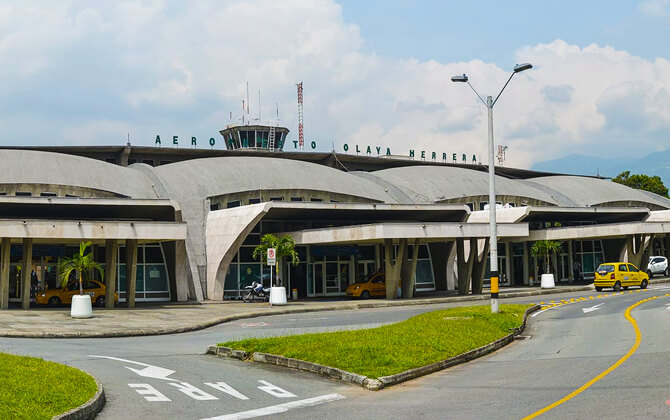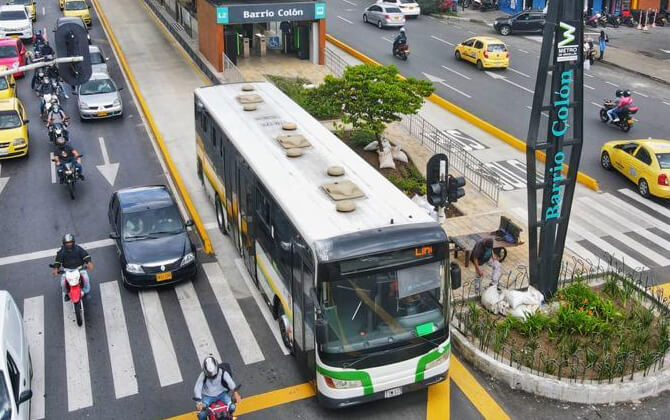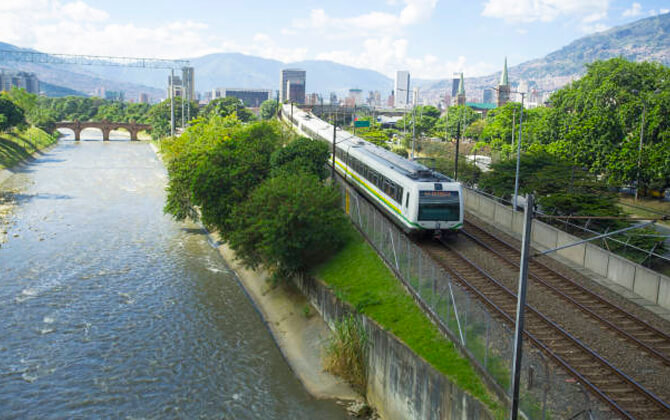The Medellín Metro is the primary public transit system in Medellín, Colombia, serving the surrounding Aburrá Valley. Opened in 1995, it remains the only metro system in Colombia.
As of 2026, the Medellín Metro consists of two main metro lines (Line A and Line B), a tram line, and several Metrocable cable car lines that link hillside neighborhoods to the city.
The network connects Medellín from north to south and east to west, providing fast and reliable transport across the region. It is part of SITVA (Sistema Integrado de Transporte del Valle de Aburrá), which also includes Metroplús bus rapid transit and feeder bus routes.
The metro is recognized for its cleanliness, safety, and efficiency, symbolizing Medellín’s transformation.
This guide details the Medellín Metro Map 2026, covering lines, stations, schedules, tickets, and connectivity options, making your travels in Medellín straightforward and convenient.
Medellin Metro Map
The Medellin metro map clearly illustrates Metro Lines A and B, Metrocable lines, the tram line, and Metroplús bus routes. The map covers municipalities such as Bello, Medellín, Envigado, Itagüí, and Sabaneta.
You can click on the image below to enlarge it or download the Medellin subway map in PDF format.
Medellin Metro Lines and Stations
The metro consists of two main train lines, Line A (north-south) and Line B (center-west), meeting at San Antonio station downtown. Combined, they cover 27 stations.
Line A – Blue Line (North to South)
Line A runs from Niquía (Bello) to La Estrella, spanning 25.8 km with 21 stations. Trains run every 3–5 minutes during peak times, taking approximately 45 minutes from end to end.
| Station | Description |
|---|---|
| Niquía | Northern terminus with park-and-ride facilities |
| Caribe | Adjacent to North Bus Terminal and Botanical Garden |
| Universidad | Serves University of Antioquia and Parque Explora |
| Parque Berrío | Central Medellín, near Plaza Botero |
| San Antonio | Main transfer hub with Line B |
| Poblado | Popular tourist area with nightlife |
| La Estrella | Southern terminus in suburban growth area |
Line B – Orange Line (Center to West)
Line B covers 5.5 km from San Antonio to San Javier with 6 stations. The full journey takes approximately 12 minutes, with trains every 5 minutes during peak hours.
Key stations include Cisneros (near EPM Library), Estadio (sports complex), and San Javier (transfer to Metrocable J and Comuna 13 access).
Stations List and Photos
Below is a complete list of Medellín Metro stations on Line A (north to south) and Line B (east to west), with brief descriptions. All stations are elevated or at-grade, have accessible entrances, basic amenities, and clear platform signage.
Line A Stations (North–South)
| Niquía | Northern terminus in Bello near MetroMall, features park-and-ride facilities. |
| Bello | Central Bello, close to the main plaza; serves densely populated neighborhoods. |
| Madera | On the Medellín-Bello border, named after the area’s timber history. |
| Acevedo | Major transfer point to Metrocable Lines K and P; elevated with city views. |
| Tricentenario | Residential area station near Tricentenario park. |
| Caribe | Next to North Bus Terminal, Parque Norte amusement park, and Botanical Garden. |
| Universidad | Access to University of Antioquia and Parque Explora science museum. |
| Hospital | Near Hospital San Vicente de Paúl and Museum of Memory. |
| Prado | Close to historic Prado mansions and Metropolitan Cathedral. |
| Parque Berrío | Downtown, adjacent to Plaza Botero and Museum of Antioquia. |
| San Antonio | Main transfer to Line B; busy downtown shopping area. |
| Alpujarra | Government district, near Plaza de Las Luces and Old Railway Station. |
| Exposiciones | Near Plaza Mayor Convention Center and Modern Art Museum. |
| Industriales | Industrial zone, close to Ciudad del Río and MAMM museum. |
| Poblado | Nearest station to nightlife at Parque Lleras in El Poblado. |
| Aguacatala | Close to EAFIT University and southern route to the airport. |
| Ayurá | Park-and-ride available, near Viva Envigado Mall. |
| Envigado | Serves historic Envigado center, restaurants, and cafes. |
| Itagüí | Central station for Itagüí city; near government buildings and central plaza. |
| Sabaneta | Rapidly developing area, 10-minute walk to Parque Sabaneta. |
| La Estrella | Southern terminus; gateway for buses from Caldas and beyond. |
Line B Stations (East–West)
- San Antonio: Eastern terminus and connection to Line A; downtown shopping area.
- Cisneros: Near EPM Library, fountains, and parking structure.
- Suramericana: Adjacent to SURA headquarters, Los Conquistadores neighborhood, and Unicentro Mall.
- Estadio: Next to Atanasio Girardot Stadium and sports facilities.
- Floresta: Located in La Floresta, close to park and media studios.
- Santa Lucía: Residential area station serving local communities and businesses.
- San Javier: Western terminus, transfer to Metrocable J; gateway to Comuna 13.
Medellin Metro Cable Car Lines (Metrocable)
The Medellin metro cable system connects steep hillside neighborhoods directly with metro lines, improving accessibility and mobility.
Medellín operates six Metrocable lines (K, J, L, H, M, P), each identified by a color and letter. Cabins hold up to 10 passengers and run frequently.
- Line K (Green): Acevedo to Santo Domingo Savio (9-minute ride).
- Line J (Yellow): San Javier to La Aurora (12-minute ride).
- Line L (Brown, Arví cable): Santo Domingo Savio to Parque Arví, with separate fare and schedule (15–17 minutes).
- Line H (Magenta): Connects Oriente tram station to Villa Sierra (5-minute ride).
- Line M (Purple): From Miraflores tram station to Trece de Noviembre (5 minutes).
- Line P (Red): Acevedo to El Progreso, northwest neighborhoods.
The Metrocable system, introduced in 2004, significantly enhances urban connectivity and community development.
Medellin Tramway Lines
T-A Line (Green Tramway Line)
The T-A tram line (Ayacucho Tram) extends 4.3 km along Ayacucho Avenue, linking the city center at San Antonio with eastern neighborhoods. Using rubber-tired vehicles, it smoothly handles steep slopes.
Main stations include San Antonio (central metro hub), Buenos Aires (historic district), Miraflores (Metrocable M connection), and Oriente (Metrocable H connection).
The complete route takes about 20 minutes, with trams arriving every 6–8 minutes during peak hours. Tram travel integrates fully with metro fares, requiring no extra ticket.
The tram route revitalized the Ayacucho corridor, enhancing urban life with easy access to cafés, murals, and shops.
Tip: Combine tram and Metrocable lines for a scenic experience.
Medellin Metro Schedule and Timetable
Operating Hours (Opening and Closing Times)
The Medellín Metro operates with convenient operating hours:
| Days | Operating Hours |
|---|---|
| Monday to Saturday | 4:30 AM – 11:00 PM (last departures around 10:30–10:45 PM) |
| Sundays and Holidays | 5:00 AM – 10:00 PM (last departures around 9:30 PM) |
Metrocable lines typically follow the metro schedule but start slightly later on Sundays:
- Line K: ~8:30 AM Sundays
- Lines J, H, M: ~9:00 AM Sundays
- Line L (Arví): Tue–Sat 9:00 AM–6:00 PM, Sun/Holidays 8:30 AM–6:00 PM (closed Mondays)
Timings Today
If today is a weekday, the metro operates from 4:30 AM to 11:00 PM. Rush hours (6:30–8:30 AM, 5:00–7:00 PM) have more frequent trains. Sunday services start from 5:00 AM (metro) and 8:30–9:00 AM (cable cars), finishing at 10:00 PM. Special events sometimes extend these timings.
Train Frequency
Typical frequencies are:
| Time Period | Line A | Line B | Tram |
|---|---|---|---|
| Peak Hours | ~3 min | 4–5 min | 6 min |
| Midday | 5–6 min | 6–8 min | 6–8 min |
| Evenings & Sundays | 7–10 min | 7–10 min | 7–10 min |
Metrocable cabins arrive continuously every few seconds.
Last Train Schedule and Running Times
Last train departures:
- Line A: ~10:45 PM weekdays, ~10:02 PM Sundays (La Estrella northbound)
- Line B: San Javier ~10:30 PM weekdays, San Antonio ~10:40 PM weekdays
- Tram (Line T-A): ~10:40–10:45 PM weekdays, earlier Sundays
Running times per route:
- Line A: ~42 minutes
- Line B: ~10–11 minutes
- Tram: ~20 minutes
- Metrocable: 4–17 minutes (varies by line)
Be on platforms at least 15–20 minutes before closing times to avoid missing last trains. Transfer stations ensure coordinated connections.
Medellin Metro Ticket Prices and Fares
How Much Does Medellin Metro Cost? (COP and USD)
In 2026, Medellín metro fares are affordable. Fares with the Cívica card:
- COP $3,430 (~USD $0.82) with personalized card
- COP $3,900 (~USD $0.93) without card or single-use ticket
Metrocable Line L (Arví) has an additional fare: COP $13,700 (~USD $3.25) per direction.
Fare Calculator
Simple fare breakdown:
- One-way metro/tram/cable: COP 3,430 (card), COP 3,900 (no card)
- Integrated bus transfer: COP 3,890–5,920 (Cívica required)
- Line L: +13,700 COP each way
Card and Passes
- Personalized Cívica Card: Best fare, ID required, approx. COP 10,900 fee
- Eventual Cívica Card: Reloadable, anonymous, COP 3,900 per ride
- Single Ride Ticket: COP 3,900 per ride
Special discounts available for seniors, students, and persons with disabilities.
Day Pass
No unlimited day passes currently available. Each ride is paid individually. Getting a Cívica card is recommended for savings.
Connections to Medellin Airport
The Medellin metro system connects indirectly to both airports:
- José María Córdova Airport (MDE): Metro Line A to Exposiciones or Parque Berrío, then airport shuttle (~COP $20,000, 40–60 min)
- Olaya Herrera Airport (EOH): Near Industriales station, short taxi ride (~COP $10,000)
Allow ample travel time and consider traffic conditions.
Medellin Public Transport Integration
Medellín’s public transport is fully integrated under the SITVA system. The Cívica card provides seamless access to metro, Metroplús buses, feeder buses, trams, cable cars, and bike-sharing.
Medellin Metro Bus (Metroplús + Feeder Routes)
The term “Metro bus” typically refers to the Metroplús Bus Rapid Transit (BRT) system and feeder buses linking metro stations to neighborhoods.
Metroplús Lines
- Line 1: From Universidad de Medellín (west) to Parque Aranjuez (northeast), with 20 stations. Transfers available at Industriales (Line A) and San Antonio (tram).
- Line 2: Similar to Line 1 but passes through downtown via San Diego; approximately 21 stations.
- Line O: Electric bus circular route connecting Caribe station (North Terminal) and La Palma (Envigado).
Using the Cívica card allows integrated fares and discounted transfers. Cash fares do not provide discounts.
Feeder Buses
Feeder routes like Route 313i link residential areas with stations such as La Estrella, Niquía, and Itagüí. These routes usually use small yellow buses. Fares can be paid using the Cívica card or cash, but cash fares do not offer transfer discounts.
Other Local Transport Options
City Buses
Regular city buses run on fixed routes across Medellín and are usually not integrated with the Cívica card. However, some corridors are transitioning to digital fare systems. In 2026, the standard bus fare is approximately COP 2,700, paid in cash.
Collective Taxis and Chivas
In rural or suburban areas, colectivos (shared taxis) and chivas (colorful buses) operate as public transport options.
Bike Integration (EnCicla)
EnCicla is a free public bike-sharing system with stations at Universidad, Estadio, Suramericana, among others. It requires registration and linking to a Cívica card.
Intercity Terminals
- North Terminal (Terminal Norte): Connected to Caribe station via pedestrian bridge.
- South Terminal (Terminal Sur): Short walk or taxi ride from Poblado station.
Taxi and Ride-hailing Apps
- Yellow taxis are widely available; minimum fare is around COP 5,600.
- Apps such as EasyTaxi, Cabify, and Uber operate, though Uber’s legality is semi-official.
Practical Tips
- Metro, tram, and Metrocable are ideal for rapid main-route travel.
- Metroplús buses serve east-west routes and areas away from direct metro coverage.
- Use feeder buses or EnCicla for shorter, last-mile connections.
- A Cívica card provides discounted fares and smooth integration between different transport modes.
Metro Parking
Official parking options with discounts near stations:
- Ayurá Station: COP 4,500/day with metro use
- Cisneros Station: COP 34,200/day with metro use
Validate parking tickets at stations with your Cívica card for discounts.
Bicycle Parking
Available at 8 stations including Niquía, Bello, Universidad, Poblado, Aguacatala, Floresta, Estadio, Santa Lucía.
Safety and Useful Information
The Medellín Metro system is safe, clean, and monitored by security. Stay alert for pickpockets during rush hours. Secure your belongings and follow basic safety protocols. Metro staff and security officers are present at major stations.
Guide: How to Use Medellin Metro Safely and Efficiently
- Get a Cívica Card for best fares
- Avoid rush hour if possible
- Secure belongings carefully
- Respect escalator and platform etiquette
- Follow safety rules, especially downtown at night
Expansion Projects
Medellín continues to expand its transit network to reduce congestion and improve accessibility. Several projects are underway or planned to further integrate communities into the metro system.
Upcoming Lines and Stations
Metro de la 80 (Line E)
A significant project, Metro de la 80 (Line E), is a 13.3 km tram/light rail line running along Avenida 80 on the city’s western side. The line includes 17 stations connecting Caribe station in the north to Aguacatala in the south.
| Phase 1 | Caribe to Floresta |
| Interchanges | Lines A and B at Caribe, Floresta, Aguacatala |
| Estimated completion | Late 2020s |
Infill Stations on Line A
Two new stations are being considered to fill gaps between widely spaced stations:
- Between Industriales and Poblado (near Ciudad del Río)
- Between Envigado and Itagüí (Guayabal area)
Recent Expansion: Metrocable Line P
In 2021, Metrocable Line P (Picacho) began operating, connecting northwestern neighborhoods to Line A at Acevedo with three cable car stations.
New Trains and Capacity Upgrades
In 2019, 22 new trains were introduced to boost capacity, with further expansion planned. Upgrades to communication-based train control (CBTC) signaling are underway to increase train frequency.
Projected Improvements for 2026 and Beyond
Airport Tram Connection (Concept)
A tram-train line to José María Córdova Airport from Acevedo or the tram terminus is under study, potentially operational by the 2030s.
New Metrocable Lines
A new Metrocable line is planned for Itagüí, south of La Estrella, to improve service for hillside communities.
Line A Extensions (Proposals)
Extensions for Line A are proposed northward to Barbosa and southward to Caldas, though these remain in early planning stages.
Regional Train (Ferrocarril de Antioquia)
A proposal exists to reintroduce a regional train linking towns in the Aburrá Valley to complement the metro and enhance regional mobility.
Infrastructure Upgrades
- Platform extensions and new elevators at high-traffic stations
- Improved signage, lighting, and accessibility features
Green Initiatives
- Solar panels and water-saving systems at stations
- Introduction of electric buses on Metroplús Line O
- Recycling programs and eco-education within the transit system
Metrocable Enhancements
Additional cable car cabins on Lines K and J will increase frequency and reduce wait times.
EnCicla and Smart Payments
The EnCicla bike-share system will expand to more metro stations, and mobile payment integration with the Cívica system is being developed.
What to See from the Medellin Metro
Riding the Medellín Metro offers scenic views and convenient access to the city’s main attractions. Below are highlights by line.
Line A (North–South)
| Acevedo–Caribe: | Downtown and mountain views (west side going south) |
| Industriales–Exposiciones: | Crossing Medellín River near Parques del Río |
| Near Universidad: | Botanical Garden domes and Parque Explora museum buildings |
| Poblado–Aguacatala: | El Poblado skyline and southern neighborhoods |
Line B (Center–West)
Heading west toward San Javier, enjoy panoramic city views near Estadio and Floresta stations, especially at sunset. San Javier station itself offers a viewing terrace overlooking the valley.
Metrocable Line K (to Santo Domingo)
This cable car provides impressive aerial views over Medellín. The Santo Domingo station features a scenic terrace close to the famous Spain Library (Biblioteca España).
Metrocable Line J (to La Aurora)
Offers remarkable views of Comuna 13 and western Medellín. The La Aurora station provides rural landscapes combined with city panoramas.
Metrocable Line L (to Arví)
A nature-focused ride above forests and valleys leading to Parque Arví, where visitors can enjoy hiking trails, picnic areas, and scenic viewpoints.
Tram Line T-A and Metrocable H/M
Along the Ayacucho corridor, travelers can appreciate vibrant urban murals, especially near Buenos Aires station. Lines H and M offer expansive views over the eastern districts and valley.
Station Vicinity Attractions
| Acevedo: | Gateway to Metrocable K and P |
| Caribe: | Botanical Garden, Parque Explora, Planetarium |
| Universidad: | University of Antioquia and Botanical Garden |
| Parque Berrío: | Plaza Botero, Museum of Antioquia |
| San Antonio: | Junín Street, historic San Antonio Plaza |
| Alpujarra: | Plaza de Las Luces, Old Railway Station |
| Industriales: | Ciudad del Río, MAMM museum, cafes |
| Estadio: | Atanasio Girardot Stadium complex |
| Poblado: | Parque Lleras nightlife, restaurants |
| Sabaneta: | Local charm around Parque Sabaneta |
| La Estrella: | Valley views and La Estrella park access |
Scenic Ride Recommendations
Morning southbound trips on Line A (around 8–9 AM) offer excellent sunlit views from the west side. Evening rides on Metrocable Line K provide stunning sunset and city lights vistas.
Free Metro Tour
The Metro offers a free cultural tour in Spanish, including a visit to the Metro Museum. Ask about availability and schedule at the Tourist Point in San Antonio station. Don’t forget your camera for capturing great views.

